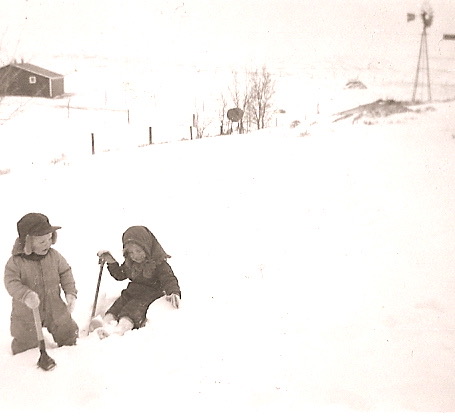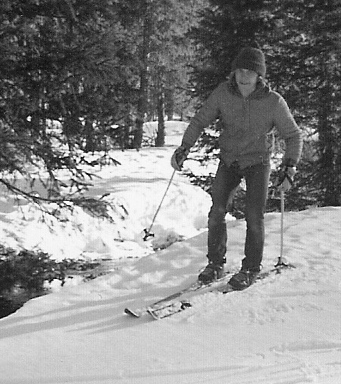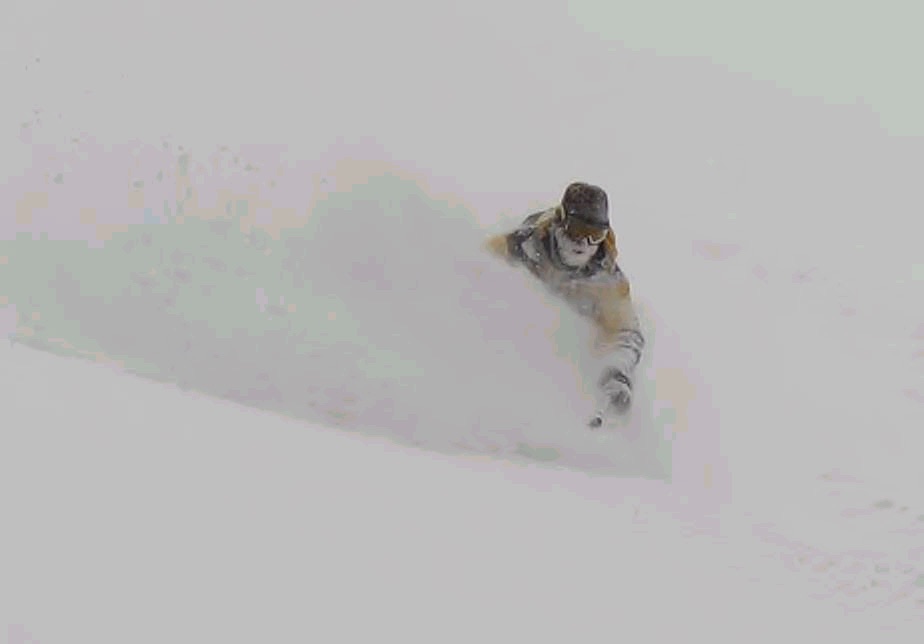LEARNING TO SKI


“Joy is the response of a lover receiving what he loves. This is the joy we feel when skiing powder…” Delores LaChapelle, from “Deep Powder Snow”
“Skiing is not a matter of life and death. It’s much more important than that.” Ski bum, circa 1970s
“We’re going up to Sunrise Ski Area this weekend. Would you like to join us?” inquired my friend Smitty, as we walked out of calculus class at Arizona State University.
“Wow! That sounds like fun. How much will it cost?”
“Four of us are sharing the gas, and the lift ticket and rental are about fifteen dollars, so probably about twenty-five dollars, including beer.”
“Sounds cool! I’ll go,” I replied and walked back to my apartment, very excited about the adventure. Up until then, my life in college had not been very athletic. I was quite poor, and seventeen hours of engineering classes plus thirty hours of working at a gas station, didn’t leave much time for anything else. I was also suffering from a chronic sinus problem that zapped most of my energy, and I suspect that most people would have classified me as somewhat of a nerd.
But the thought of skiing brought back instant memories of the farm where I had grown up and of skiing as a young child. All of my grand parents had immigrated from Scandinavia, and two of them had homesteaded in the rolling hills that border the Badlands of North Dakota. They had spent their first winter in a sod house that was 16 miles from the nearest town, and a basic journey for supplies took two days. They would leave early in the morning with their horse and buggy, and depending on the conditions of the road and creek that needed to be crossed, usually arrived in the early afternoon. After shopping until evening, they spent the night in a local hotel and left early the next morning to return to the farm. They made the trip less than once a month, so they learned to be very self-sufficient and grew most of their own food.
My father arrived in North Dakota at the age of two and he survived the Dust Bowl and the Great Depression that came with it. He went to school in a town that was about seven miles away and drove a school bus to help with the expenses. The school bus was a horse-drawn buggy, and my father got up well before dawn to rig the carriage for the journey. He told us often about his past — about how hard his parents had worked to break the sod with a horse-driven plow and how very lucky we were to be living in this modern world.
My Mother was the daughter of Swedish and Norwegian immigrants and had grown up in the Lake
District of western Minnesota, where she had taught elementary-school students in a one room building. She arrived at six in the morning to start the wood stove and prepare for the students, who arrived at eight.
Somehow, she met my father and moved to the lonesome prairies of North Dakota to share his life. She didn’t know anyone there except my father, but her gregarious personality and incredible attitude were warmly welcomed, and she soon made many friends and became very active in the local community.
My ancestors had quickly assimilated into the American culture, but they kept some of their Scandinavian customs, and my parents gave me a pair of skis for Christmas when I was about ten. It was about fifteen degrees below zero, but I quickly donned my winter gear and rushed to the nearest hill. The skis were made of wood and did not have metal edges, and the bindings consisted of a single strap that lapped over the top of my rubber snow boots which were not stiff. The snow was wind-packed and sparse, but I managed to find a hill with enough snow and a little bit of gradient and tried repeatedly to make it down without crashing.
“You look just like a snowman. Aren’t you freezing?” exclaimed my Mom with a big smile. “You better come in and change your clothes before you milk the cows. I’m starting supper, so you better hurry.”
I didn’t want to stop without completing a run, so I hiked up the hundred-yard hill one more time and watched the bright red colors of the alpenglow explode over the harsh, white landscape of the frozen prairie. The light was beginning to fade, and a brisk breeze made the subzero temperatures feel even colder, but I didn’t want to finish the day defeated and this was my last chance. I crouched over the skis and concentrated as hard as I could while they started to move down the gentle slope. I teetered back and forth, but managed to stay balanced as the skis accelerated and approached the transition that I had wiped out on all afternoon. A little more forward lean managed to defy the forces that had defeated me before, and I joyously finished the hill without crashing.
“I think he likes his present,” remarked my father with a big chuckle, as I quickly changed clothes and rushed out to help him finish the chores.
That night the family feasted on a deluxe Scandinavian dinner which included Lutefisk, sweet potatoes, and apple pie. My father patiently turned the handle of our old ice-cream maker, and after a second dessert, I fell asleep and dreamed about skiing. We had a large portrait of a beautiful mountain in our living room, and I often thought about what it would be like to stand at the top. On that magical Christmas night, I had a wonderful dream about skiing down from the summit.
Our family included my grandmother and three sisters, and we shared a playful dog, about a dozen cats, a small herd of Hereford cattle, four horses, and a flock of chickens on about 1000 acres of mostly rolling hills with an intermittent stream and a few ponds. My favorite horse was very tame, and I could jump on his back and ride him without any equipment. He always looked happy to see me and would respond to a gentle push on his neck and would gladly carry me wherever I wanted to go.
The spring thaw was always very exciting, and my sisters and I would launch small boats in the intermittent stream and follow them through the muddy pastures. Our nearest neighbor was about a mile and a half away, and we shared the land with the local wildlife that included deer, antelope, coyotes, badgers, foxes, weasels, and many birds. It was always a joy to see the migrating birds return in the spring, and my mom would leave scraps of cloth in the yard to help them build their nests in the large grove of trees that my grandparents had planted. The most level and fertile land was used to grow the crops of wheat, oats, and corn, and the steep hills were left in their natural state for grazing. We also had a huge garden, and my mother would can vegetables to last all winter. We filled the freezer with fresh meat from the farm and traded eggs and milk for the other staples.
Life on the farm was a constant adventure, and the short summers were spent preparing for the long winters. The animals needed to be fed, regardless of the weather, and the crops needed to be planted and maintained. I learned to drive a tractor when I was twelve and spent many long summer days tilling the fields. The freshly turned soil had a very pleasant fragrance, and I often saw antelope or deer or the many birds that shared our farm.
I had my first climbing experience while attending a one-room school at the age of six. The school had one teacher who taught grades one through eight in the same room. There was an old barn on the property with a broken stairway leading to an attic, and two of the older boys had managed to climb up to it, so I decided to follow. Most of the treads were gone but there were a few remnants of the structure, and by carefully stemming the old supports, I was able to reach the upper level. The older boys were very impressed, but the teacher was not, and we were scolded severely. I didn’t climb again for 16 years.
As I grew older, my activities changed to fast cars, motorcycles, and playing with girls in haystacks, but the skiing and climbing had made a serious impression that was waiting patiently to return.
…………………………………………………………………………………………..
Our excited group left the big city before dawn and watched a dramatic, red sunrise as we drove up the long winding road through the sparse vegetation of the Sonoran desert, then onward into the lush forests of the White Mountains. As we climbed out of the polluted city, my sinus congestion eased, and the clear mountain air seemed to awaken a dormant spirit that had been waiting patiently inside me.
Our conversations flowed freely, and we joked about the school, the professors, and the beautiful girls that were tormenting us.
“Hey look at that!” exclaimed Phil, as he pointed to the fresh snow. “It’s gonna to be a great day.” A few moments later we reached the parking lot.
“We have our own gear, but the rental place is right over there. We’ll wait if you hurry,” remarked Smitty, as I ran off to acquire my gear.
They were charitable enough to take me down an intermediate run first, and I was amazed at how much more control I had with the modern gear. Going straight was quite easy, but turning and stopping were new challenges that I gradually learned.
“Wow! I think that this is the most fun that I have ever had,” I told Phil, as we rode up the chair for the last run.
“Glad to hear that you are enjoying it. Wanna do a black diamond for the last run?” He asked.
“Sure! Why not?” I replied, as we headed down the steep slope.
I arrived at the bottom about fifteen minutes — and ten crashes — later than my friends, who were already enjoying a beer. My Levi’s were soaked, and I was completely covered with snow, but my smile was ear to ear.
“You look just like a snowman,” noted Smitty, but all I could do was laugh.
I carved turns in my dreams, as we drove back to the big city in the desert, and I vowed to return as soon I could.
It was 1972. The Vietnam War was raging, and the early signs of the planet’s destruction were just starting to hit the news.
I decided at that moment that I did not want to be part of the corporate machine that was endangering the planet. For the first time in my life, I had found something that I truly enjoyed, and I made a vow to do everything that I could to pursue it.
One of my best friends had moved to Flagstaff and offered me some floor space, when I told him about my new passion. I managed to save enough money for a one-week journey, and those seven days of incredible skiing confirmed my addiction.
Vietnam was my only real barrier. If I had quit college then, I would probably have been drafted, and I did not want to risk my life in a war that did not concern our country. That year, a new legislation created a lottery to determine who would be drafted, and my friends and I sat anxiously in front of a television, as an official-looking man in a fancy suit drew our birthdays out of a large bowl. I watched a couple of my friends turn white, as they suddenly realized that their lives were about to change drastically, but I was one of the lucky ones and drew a very high number. I breathed a huge sigh of relief and started to plan an escape from my current life.

